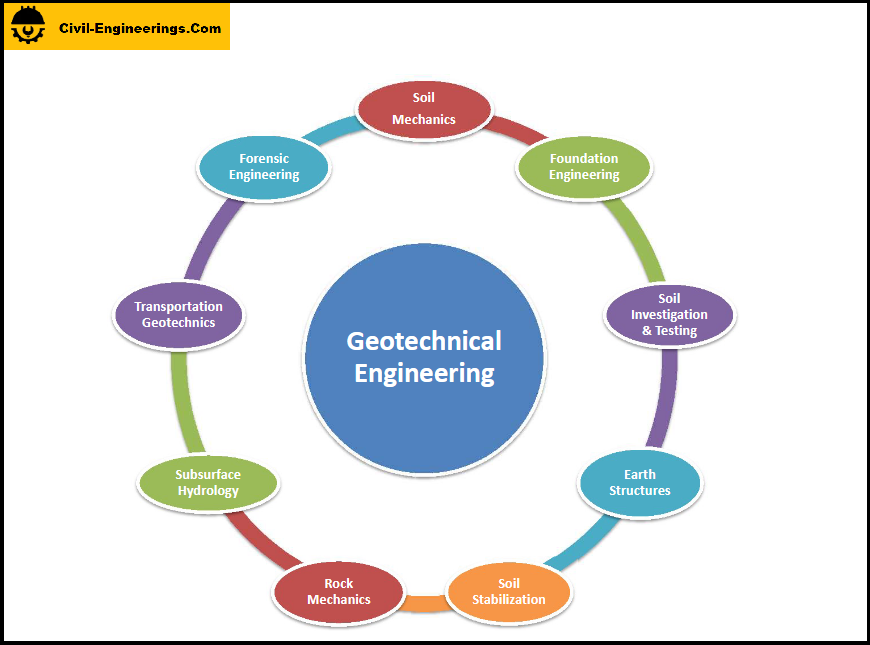The 20-Second Trick For Specialized Geotechnical Engineering Solutions
The 20-Second Trick For Specialized Geotechnical Engineering Solutions
Blog Article
Our Specialized Geotechnical Engineering Solutions Statements
Table of ContentsThe Definitive Guide for Specialized Geotechnical Engineering SolutionsThe Ultimate Guide To Specialized Geotechnical Engineering SolutionsSpecialized Geotechnical Engineering Solutions Things To Know Before You Get ThisSpecialized Geotechnical Engineering Solutions Things To Know Before You Buy
They perform website examinations, gather examples, perform research laboratory examinations, and analyze information to assess the suitability of the ground for building tasks. Based on their searchings for, geotechnical designers give referrals for foundation layout, incline security, keeping frameworks, and mitigation of geotechnical dangers. They collaborate with other professionals, such as engineers, structural engineers, and building groups, to make certain that geotechnical factors to consider are integrated into the total job design and application.
Foundation Layout: Geotechnical designers play an essential role in developing foundations that can safely support the intended structure. They assess the dirt conditions and tons demands to figure out the ideal structure type, such as superficial structures (e.g., grounds), deep foundations (e.g., heaps), or specialized strategies like soil enhancement. They take into consideration aspects such as settlement restrictions, bearing ability, and soil-structure communication to develop ideal foundation designs.
The Best Strategy To Use For Specialized Geotechnical Engineering Solutions
Below are some sorts of geotechnical designers: Structure Engineer: Structure designers focus on creating and analyzing foundations for structures - Specialized Geotechnical Engineering Solutions. They assess the soil conditions, tons requirements, and site attributes to identify the most suitable foundation kind and layout, such as superficial structures, deep foundations, or specialized techniques like heap structures
They perform field testing, collect examples, and examine the gathered information to define the soil residential properties, geologic developments, and groundwater conditions at a site. Geotechnical Instrumentation Engineer: Geotechnical instrumentation designers focus on tracking and gauging the behavior of soil, rock, and structures. They set up and keep instrumentation systems that monitor variables such as soil settlement, groundwater degrees, incline motions, and architectural displacements to assess efficiency and give early warnings of potential issues.
In the office environment, geotechnical designers utilize specialized software program tools to perform computations, develop designs, and evaluate data. Specialized Geotechnical Engineering Solutions. They prepare records, review project requirements, interact with customers and staff member, and coordinate job tasks. The workplace setup provides a favorable environment for research study, evaluation, and cooperation with various other professionals associated with the project
They often check out task websites to perform website investigations, analyze geotechnical problems, and top article collect information for evaluation. These check outs involve traveling to different locations, in some cases in remote or difficult terrains. Geotechnical engineers may perform dirt tasting, conduct examinations, and monitor building activities to make sure that the geotechnical elements of the job are being carried out properly.
The 7-Second Trick For Specialized Geotechnical Engineering Solutions
Geotechnical designers additionally work in specialized geotechnical research laboratories. In these facilities, they conduct experiments, execute tests on dirt and rock examples, and assess the design buildings of the products. Geotechnical laboratory designers work extensively in these atmospheres, dealing with screening devices, operating instruments, and videotaping data. They collaborate with other lab staff to guarantee accurate and reliable testing outcomes.
Keeping Wall surfaces: Developing walls that keep back soil to avoid landslides and offer security on sloped terrains. Embankments and Earthworks: Designing embankments for roadways, trains, and dams to ensure they stay secure under tension. The mining market counts greatly on geotechnical engineering to guarantee the security and long life of its operations.
With this in mind, we have actually made our program to prepare trainees for success. Geotechnical engineers are entailed in all phases of the design of structures, from principle to building and construction. Their work is important in the design and preparation process as they evaluate the honesty of dirt, clay, silt, sand, and rock, prior to building and construction starting.
All About Specialized Geotechnical Engineering Solutions
This is followed by a ground examination based on the findings of the workdesk research and involves trial matching and tasting to uncover any type of possible concerns. Geotechnical engineers function within multidisciplinary teams, supported by intermediate and junior engineers along with by CAD specialists. As a senior geotechnical designer on a hydro plant task, tasks may include taking part in technological reviews (e.g., peer evaluations), tailings dam examinations, dam safety and security reviews, and other research studies connected to the design and building of mine waste facilities.
While some specialists are experts solely in geotechnics, others may function under titles like design rock hound or ground designer within comparable capacities. As a click for source geotechnical engineer, you'll need to: develop and preserve relationships with clients and other professionals associated with the website, throughout each projectmaintain safety and security standards on website be mindful of cost implications when you make recommendationsstudy geological maps and aerial photographs from a range of sources and from different time periodsexamine construction intends to see just how possible they are based on your understanding of the siteinvestigate dangers or geological risks for the sitesearch for ecologically sensitive features, such as land fill beginning to create accurate and interpretive ground modelsplan field investigationsdrill and evaluate samples of bedrock, dirt, groundwater and added products oversee other professionals on sitesolve technical issues as you can check here they arise, such as unanticipated frameworks at drill sitesmonitor conditions throughout and after building to see to it structures are stable in the brief and long termadd information gathered on site to your preliminary researchcreate geotechnical calculations, illustrations, and two or three-dimensional computer designs interpreting the datamake referrals regarding the proposed usage of the site.
There are lots of opportunities to fulfill new individuals, as you'll collaborate with a variety of experts at every website. The job can be stressful as you might be accountable for the safety and security of others while on site. There is additionally a high degree of monetary responsibility, as the suggestions you make can have serious price implications.

Report this page